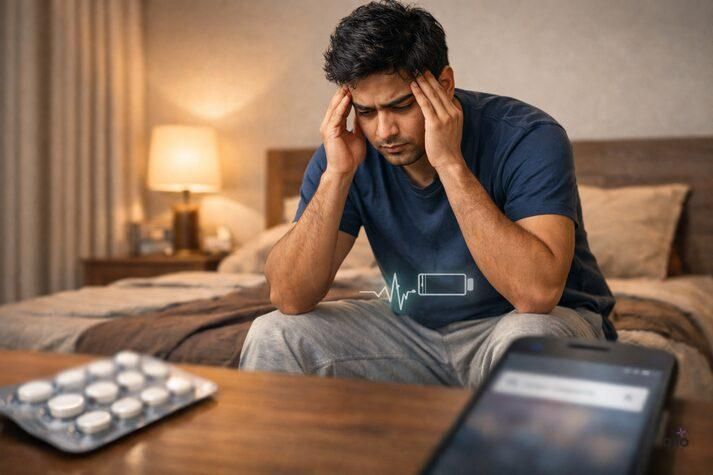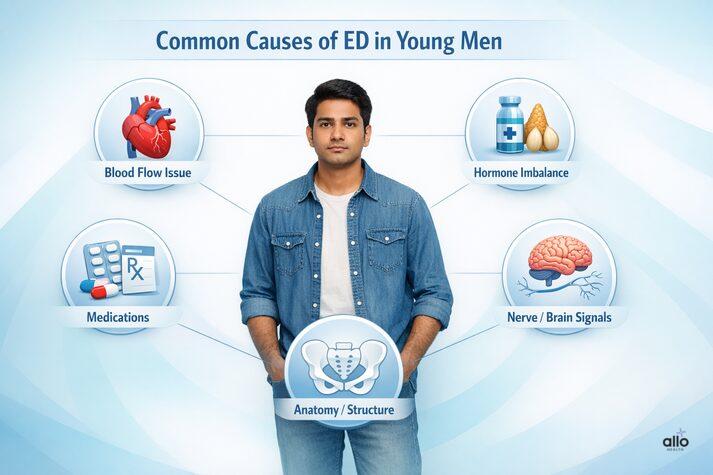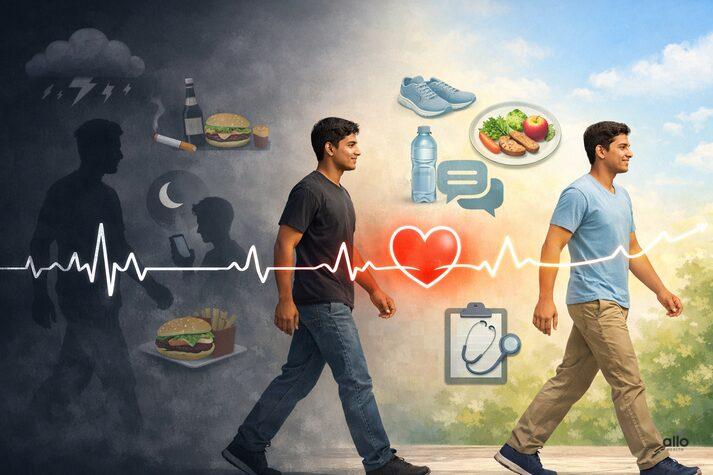Erectile Dysfunction in Young Men: Causes and Solutions
Medically reviewed by Dr. Sandip Deshpande

Dr Sandip completed his training in Psychiatry and sexual medicine in the UK. A post-graduate in Psychiatry from KMC Manipal, he worked in the UK for over 8 years following a one-year research post at NIMHANS, Bangalore. With an interest in the fields of sexual health and functioning, he has authored articles in books and peer-reviewed journals. A recipient of the student of the year award by BSART in 2010, he is currently a consultant psychiatrist and sexual and relationship therapist with a belief in a holistic and psychotherapeutic approach to treating psychological distress.
•
Written by Dr. Pranitha Bangera

Dr. Pranitha Bangera is a gold-medalist healthcare professional with an elite foundation in clinical training and patient care. A researcher at heart, she specializes in creating high-impact, research-driven medical content that empowers readers through accessible patient education. Dr. Bangera focuses on the intersection of digital health and clinical communication, specifically within the fields of sexual health and mental well-being. Her work is dedicated to making complex medical innovations understandable and trustworthy for a global audience.
•
January 22, 2026
Our experts continually monitor the health and wellness space, and we update our articles when new information becomes available.

Quick Read
Erectile dysfunction can affect men even in their 20s and 30s, and it's more common than you might expect. The causes can be physical, like poor blood flow or hormonal imbalances, or psychological, like stress and anxiety. Lifestyle habits such as smoking, alcohol, and lack of exercise also play a role. The good news is that ED in young men is often treatable through medication, counseling, medical devices, or healthy changes in daily habits. Don’t wait to seek help; recovery is possible.
Being in your 20s with erectile dysfunction can feel confusing, stressful, and even scary. Many people assume ED only happens to older men, but it can affect younger men, too. It can be even more alarming, especially when everything seemed normal before.
There are many causes for erectile dysfunction in young males, and most are not permanent. Common reasons include stress or performance anxiety, lifestyle factors like poor sleep or smoking, and medical issues such as hormone imbalance or early blood flow problems.
In this article, we will look at why sudden erectile dysfunction in your 20s happens, what it can mean, and how it compares to sudden erectile dysfunction at 30 years old, along with the best next steps to get back confidence and stronger erections.
Allo asks
What do you think is the most common trigger behind sudden ED in young men?
How Common is ED in Young Men?
Erectile dysfunction (ED) is often treated like an “older men’s problem,” but real-world data show it shows up in the 20s and 30s, too. The exact number varies because studies define ED differently, but the takeaway is clear: young age doesn’t fully protect against ED.
In a large survey, ED was reported by about 7% of men aged 18–29 and 9% of men aged 30–39. [1]
And when you look at men who actually seek medical help, the proportion can be even more noticeable: a clinic study found that about 1 in 4 men seeking first-time treatment for new-onset ED were under 40. [2]
Erectile dysfunction (ED) is often thought of as an age-related issue. People think it's something that mainly affects older men. But here’s the surprising truth: many young men in their 20s and 30s experience it too. So, what to do if you’re 20 with Erectile Dysfunction? In younger men, ED is often linked to stress, anxiety, lifestyle factors like poor sleep or alcohol use, or even early signs of hormonal imbalances. These causes are usually treatable. Understanding what’s behind your symptoms is the first step toward getting help and improving your condition. [3]
Symptoms or Signs to Look for Erectile Dysfunction
Erectile dysfunction means you have trouble getting or keeping an erection that's firm enough for sex. Here are some common signs to look for :
- You can get an erection sometimes, but not always when you want to. For example, you might be able to get an erection when you're alone or in the morning, but not when you're with your partner.
- You get an erection, but it doesn’t last long enough. This means you might start fine, but the erection goes away before or during sex, making it hard to complete the act.
- You’re unable to get an erection at all. Even if you’re feeling aroused, your body doesn’t respond, and you can’t get or keep an erection.
Primary Causes for Erectile Dysfunction in Young Males
While erectile dysfunction is often seen as an age-related condition, many factors can affect men in their 20s and 30s. Younger men are not immune to ED. In many cases, the root causes relate more to lifestyle, mental health, and unrecognized medical issues than aging. Here are some common reasons why young men may experience ED:
1. Poor Blood Flow to the Penis
The penis needs good blood flow for a strong erection. If the blood vessels are narrow or blocked, not enough blood gets to the penis. This is often a sign of overall poor blood circulation in the body. Even when blood flows with abnormal blood pressure in the blood vessels, it can disrupt blood flow to the penis.
Causes of poor blood flow:
- High blood pressure
- High cholesterol
- Smoking and drinking too much alcohol
- Diabetes
- Lack of physical activity
- Being overweight (obesity)
2. Hormone Problems
Hormones play a big role in sexual health. If there is an imbalance, it can lead to ED.
Common hormonal causes:
- Steroid use: Some young men use protein powders that contain steroids to build muscles. Overuse can cause erection problems and can even lead to heart problems in the long run. [4]
- Thyroid problems: Too much or too little thyroid hormone can cause ED. [5]
- High prolactin: This hormone, made by the brain, can affect erections if levels are too high. [6]
- Low testosterone: Testosterone is the primary hormone responsible for maintaining sexual health. [7]
- Rare conditions: Genetic disorders like Klinefelter syndrome or underdeveloped testicles can also lead to ED. [7]
3. Medications
Some medicines can interfere with sexual function.
Drugs that may cause ED:
- Psychiatric (mental health) medications like SSRIs or SNRIs like venlafaxine.
- Medicines for high blood pressure or cholesterol
- Heart disease medications
4. Anatomical Problems
Some physical problems with the penis itself can cause ED. Examples:
- Peyronie's disease: Curved or scarred penis
- Congenital penile curvature: Born with a bent penis
- Phimosis: Foreskin that can't be pulled back
- Underdeveloped penis
5. Nerve Problems (Neurogenic Causes)
The brain and nerves control erections. If there is nerve damage, ED can occur. Causes include:
- Injury to the spinal cord or pelvic area
- Neurological diseases like multiple sclerosis or epilepsy

Psychological Causes of ED in Young Men
It's not always your body causing erection problems. For a lot of younger guys, it's all in the head. Poor mental health can mess with erections as well, and it happens more often than you think. For some, sudden erectile dysfunction at 21 years old can be triggered by stress, anxiety, or a major lifestyle change, like starting a new job, moving cities, or even performance anxiety during early sexual experiences. Let's look at some causes:
1. Performance Anxiety
If you're stressing about how well you'll do in bed, that stress can bring everything down. The more you think about it, the harder it is to stay relaxed. Yes, that can mess with your erection.
2. Feeling Low or Anxious
If you're dealing with depression, anxiety, or just feeling off mentally, your sex drive can drop. Plus, some medications for depression (like SSRIs) can make it tougher to get hard. It's not your fault. It's just how your brain and body react.
3. Relationship Problems
If things aren't great with your partner, maybe you're not feeling close, or some tension can affect your sex life. When there's emotional stress, it can mess with physical condition, too.
4. Life Stress
Work stress, money worries, or just feeling overwhelmed with life, all that pressure adds up. When your brain's stressed out, sex isn't a priority. Your body might just hit pause without you even realizing it.
5. Not Feeling Good About Yourself
If you're not confident in your body or you're doubting yourself in bed, that can mess things up fast. Once you start thinking negative thoughts, it's hard to stay in the moment. That can lead to more problems in the bedroom.
In many young men, ED isn’t about age but about stress, lifestyle, or hidden medical conditions."
Everyday Habits That Can Mess With Your Erection
If you’re experiencing sudden erectile dysfunction at 30 years old, it could be due to constant consumption of alcohol, smoking cigarettes, using drugs, doing no physical exercise, and eating a lot of junk food. This type of lifestyle has become quite common these days.
1. Alcohol
A couple of drinks are fine. But if you're drinking often, it can kill your sex drive by messing with the blood flow to your penis. You might feel relaxed, but your body will not perform well sexually.
2. Drugs
Recreational drugs can mess with your brain and how your body responds during sex. They can dull your feelings, weaken your erection, or make it harder to finish.
3. Smoking
Smoking can cause ED as it messes up your blood flow. Good blood flow is what helps you get and maintain a good erection.
4. No Physical Exercise
If you're sitting around all day gaming, working, or doing nothing, it slows your circulation and drains your energy. Less energy equals weaker erections. Your body needs movement to keep everything running smoothly, including your sex life.
5. Eating Junk Food
Fast food, sugar, skipping meals, it all adds up. Bad eating habits can disrupt your hormones and make it harder for your body to function properly in bed. You don't need to be a health freak, but a little balance goes a long way.

Treatment Options for Erectile Dysfunction in Young Men
While erectile dysfunction is often associated with older men, it's surprisingly common in younger men, too. Physical and psychological factors, including stress, anxiety, lifestyle habits, or underlying health conditions, can all contribute to ED in men under 40. The good news? ED in young men is often treatable.
1. Oral Medications
For many young men, oral medications are a first-line treatment for ED. These include:
- Sildenafil (Viagra)
- Tadalafil (Cialis)
- Vardenafil
- Avanafil
These ED medications (PDE-5 inhibitors) work by enhancing blood flow to the penis during sexual arousal. They relax blood vessels and help fill the spongy erectile tissue compartments of the penis. This enables an erection, but they still require sexual stimulation to work.
Important Notes:
- Common side effects: Headaches, facial flushing, upset stomach
- Not suitable for those taking nitrates or with certain heart conditions
- Generally safe and effective when taken under medical supervision
2. Advanced Medical Therapies
If pills aren't effective or appropriate, other medical options may be recommended. This is especially true for young men with specific physical causes of ED.
Injection Therapy
- Medications like prostaglandin E1 are injected directly into the erectile tissue through the penile injections
- This creates a reliable erection without the need for sexual stimulation
Intraurethral Medication
- A small pellet of medicine is placed into the tip of the penis using an applicator
- It's absorbed through the urethra to stimulate an erection
Testosterone Therapy
- For young men with confirmed low testosterone levels, hormone therapy may help
- Often combined with other ED treatments if a hormonal imbalance is contributing to the problem
3. Devices and Surgical Options
Some younger men with anatomical or vascular issues may benefit from mechanical or surgical treatments.
Vacuum Erection Devices (Penis Pumps)
- A penis pump is a plastic cylinder that fits over the penis
- A manual or battery-powered pump creates suction, drawing blood into the penis
- A rubber ring holds the erection during sex
- Drug-free, non-invasive, and effective for on-demand use
Penile Revascularization Surgery
- For select young men with isolated arterial blockage (blockage in a major tube carrying blood, often due to injury), vascular surgery may restore proper blood flow
- This procedure aims to repair or bypass damaged arteries and improve natural erections
Penile Implants
- Considered only when other treatments fail
- Two main types: Inflatable prosthesis (allows control over erection timing) and semi-rigid rods (constantly firm but bendable)
- High satisfaction rate among men and partners, offering a permanent solution
4. Counseling and Psychological Support
Common causes for erectile dysfunction in young males include blood flow problems, hormonal imbalances, and psychological stress. The causes for erectile dysfunction in young males are varied but manageable with the right help.
For many young men, ED has a psychological origin. This includes performance anxiety, stress, or relationship problems.
Individual Counseling
- Psychotherapy for ED helps manage anxiety, depression, or sexual confidence issues
- Useful for breaking the cycle of stress-related ED
Couples Counseling
- Can address emotional disconnects or communication problems contributing to ED
- Builds trust and intimacy between partners
Sex Therapy
- Sex therapy for ED offers practical strategies and exercises to reduce anxiety and improve sexual satisfaction
5. Lifestyle Changes to Improve ED Naturally
Young men are often well-positioned to benefit from lifestyle changes. These steps can significantly improve sexual function and overall health.
Exercise Regularly
- Boosts blood flow and testosterone
- Helps reduce stress and improve body image
Eat a Heart-Healthy Diet
- Focus on leafy greens, whole grains, lean proteins, and healthy fats
- Good cardiovascular health directly improves erectile function
Quit Smoking
- Smoking damages blood vessels, impairs circulation, and increases ED risk
- Quitting reverses some of the vascular damage over time
Limit Alcohol Intake
- Excessive drinking dulls sensitivity and can interfere with arousal
- Moderate or no alcohol is best for sexual health
Manage Stress
- Chronic stress raises cortisol and reduces libido
- Techniques like meditation, yoga, and therapy can help relieve mental pressure
Can Erectile Dysfunction in Young Men be Reversed?
Yes, in many cases, erectile dysfunction in young men can be reversed. This is especially true when the underlying cause is identified early and treated accordingly. Some erection problems seen in younger men are more reversible than in older adults. For example, when ED comes from psychological factors like stress, anxiety, or relationship issues, it often responds well to counseling or therapy. Once these root causes are addressed, normal sexual function can return. Similarly, erectile dysfunction that develops from lifestyle habits like alcohol use, smoking, or drug use can often go back to normal once those habits are stopped. This is especially true in short-term cases, where there hasn't been permanent damage. Erectile dysfunction due to physical causes, such as hormonal imbalances, blood vessel issues, or nerve damage, is generally more challenging and takes more time to treat. However, if these physical causes haven't been present for too long, and there's no permanent damage to the penile tissue, then there's still a good chance of recovery with the right medical treatment.

Conclusion
Erectile dysfunction in young men can be alarming, but it's also highly treatable. Whether it stems from physical, psychological, or lifestyle-related causes, effective solutions are available. A healthy diet and regular physical activity are key. Especially for men with conditions like diabetes, staying active and eating well can help protect the blood vessels that supply the penis. This prevents long-term damage and improves sexual health. If you're experiencing ED, know that you're not alone. Seeking help early often leads to better outcomes and greater confidence in your sex life and overall well-being.
Disclaimer
The following blog article provides general information and insights on various topics. However, it is important to note that the information presented is not intended as professional advice in any specific field or area. The content of this blog is for general educational and informational purposes only. The content should not be interpreted as endorsement, recommendation, or guarantee of any product, service, or information mentioned. Readers are solely responsible for the decisions and actions they take based on the information provided in this blog. It is essential to exercise individual judgment, critical thinking, and personal responsibility when applying or implementing any information or suggestions discussed in the blog.
Most Asked Questions
Is it normal to have erectile dysfunction at 20?
Yes, it’s more common than people think. Many 20-year-olds with erectile dysfunction experience it due to stress, lifestyle habits, or early signs of a health condition.
What can cause sudden erectile dysfunction at 21 years old?
Sudden ED at 21 is often linked to anxiety, performance pressure, or a lifestyle shift like poor sleep, diet, or substance use.
I’m 30 and just started having ED should I be worried?
Sudden erectile dysfunction at 30 years old may point to high stress, relationship issues, or early vascular or hormonal changes. It’s usually reversible with lifestyle changes or medical help.
Does masturbation cause erectile dysfunction?
No, masturbation does not cause ED. However, guilt or anxiety around it can sometimes affect sexual performance temporarily.
How do I know if my ED is physical or psychological?
If you can get erections during sleep or masturbation but not with a partner, the cause might be psychological. A doctor can help you assess this.
Will quitting smoking and alcohol help my ED?
Yes. Both habits negatively affect blood flow and hormone levels. Quitting can significantly improve erectile function over time.
Are there any natural remedies that work for ED in young men?
Regular exercise, a heart-healthy diet, stress management, and open communication with your partner can make a big difference.
When should I see a doctor for ED?
If the issue persists for more than a few weeks or is affecting your confidence and relationships, it’s time to consult a doctor.
Sources
- 1.
The epidemiology of erectile dysfunction: results from the National Health and Social Life Survey
- 2.
One patient out of four with newly diagnosed erectile dysfunction is a young man--worrisome picture from the everyday clinical practice
- 3.
Erectile dysfunction in fit and healthy young men: psychological or pathological?
- 4.
Impact of anabolic androgenic steroids on sexual function
- 5.
Erectile dysfunction in patients with hyper- and hypothyroidism: how common and should we treat?
- 6.
Hyperprolactinemia and Erectile Dysfunction
- 7.
Male Hypogonadism
Why Should You Trust Us?
Why Should You Trust Us?
This article was written by Dr. Sandip Deshpande, who has more than 27 years of experience in the healthcare industry.
Allo has the expertise of over 50+ doctors who have treated more than 1.5 lakh patients both online and offline across 30+ clinics.
Our mission is to provide reliable, accurate, and practical health information to help you make informed decisions.
For This Article
- We reviewed over 15 top-ranking articles on erectile dysfunction to ensure this content is comprehensive and up-to-date.
- We referenced peer-reviewed research from journals like The Journal of Sexual Medicine and Urology Clinics.
- We analyzed over 10 scientific studies specifically on ED in men under 40.
- We browsed forums like Reddit, Quora, and Go Ask Alice to understand the real experiences and struggles of young men with ED.
- We took insights from popular YouTube and Instagram content where sexual wellness experts and influencers share candid tips and coping strategies.
- This article was written by a sexual health content expert and fact-checked by professionals in the field.


